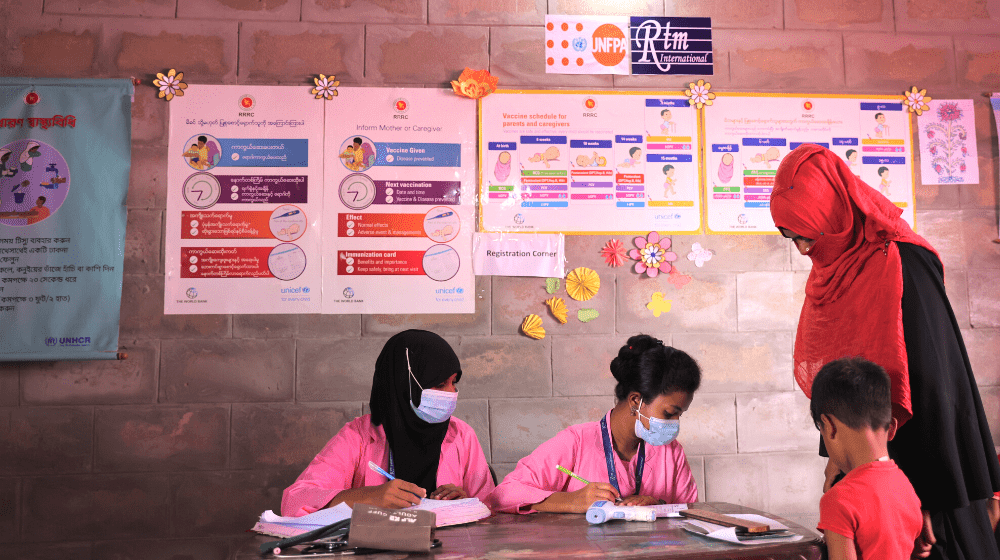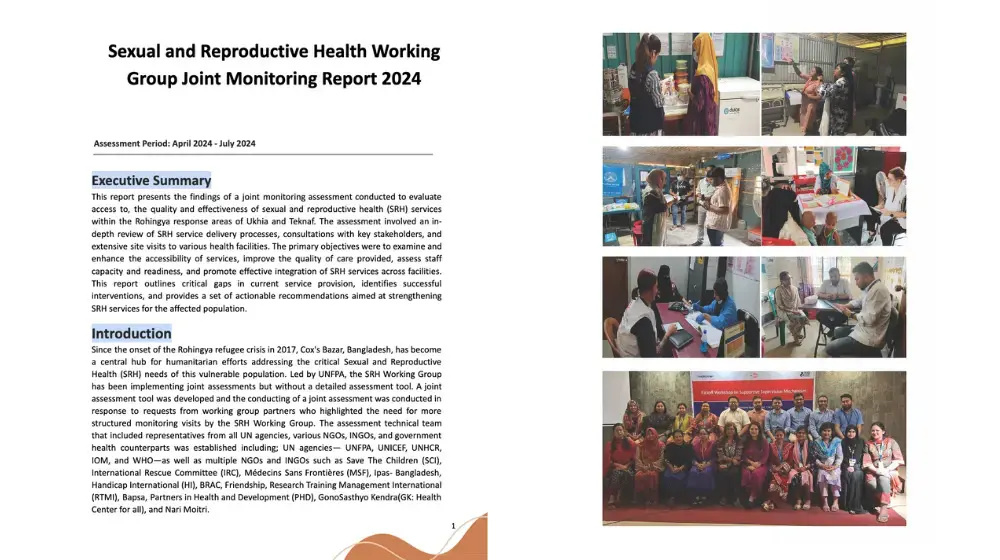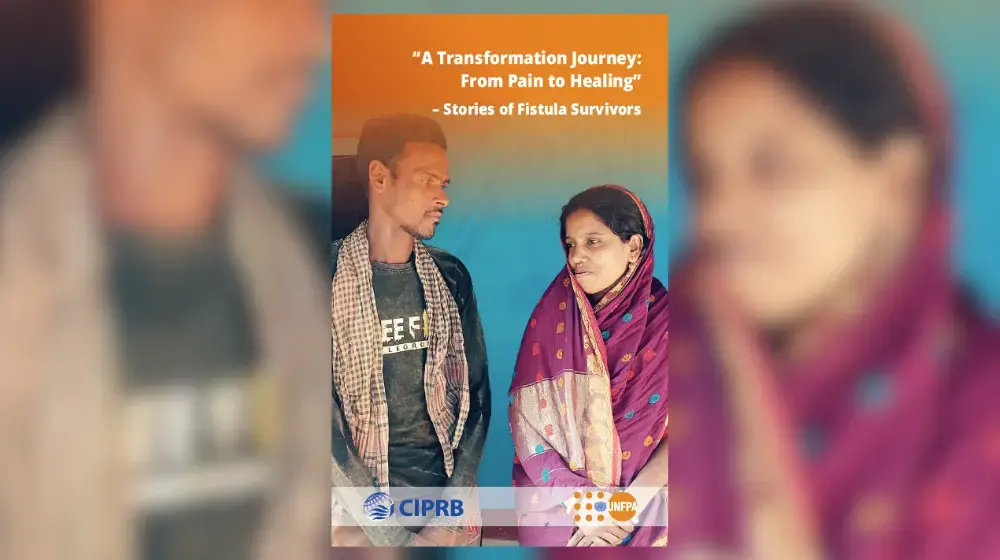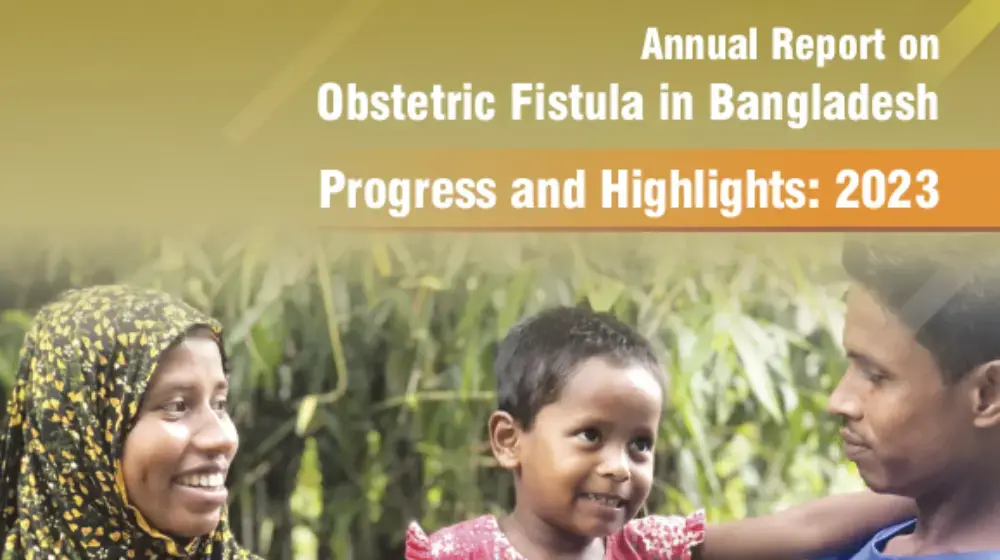Halima*, a pregnant refugee, arrived at the health post five months pregnant and feeling unwell. The midwives at the facility provided her with antenatal care, conducted regular health checkups, to ensure the well-being of her newborn. Life on the island, Bhasan Char was tough, but Halima knew she and her baby were in good hands. She was grateful for the health post, established by UNFPA - one of the few organizations that had responded quickly to the crisis and provided essential sexual and reproductive health services to women and girls living here.
She was one of the many women who are receiving essential antenatal care, regular health checkups, and guidance on recommended actions from the midwives present in the health facilities.

I learnt about the do’s and don'ts during my pregnancy from apa (the midwife), and now I am feeling much better. - says Halima
With UNFPA's support, the island saw 2,850 antenatal care visits, 99 facility-based deliveries, 348 postnatal care visits, 4,440 family planning consultations, and 2,960 counseling on family planning and discussion sessions.
UNFPA's efforts have played a crucial role in making Sexual and Reproductive health services available to women and girls, while providing a sense of safety and protection for women and adolescents on the island. Consequently, UNFPA is also providing support in line with the local health system by training midwives, making the essential commodities available and thus strengthening the capacity of health facilities.
Moreover, UNFPA established a women-friendly space that provides a secure environment for women to gather, connect, share experiences, and learn new skills. The space offers GBV, SRH, PSEA awareness and information sharing sessions, and skill development on stitching, embroidery, and weaving mats and handicraft items, enabling women and adolescent girls to learn different life skills. Alongside, through the GBV prevention activities women, men, girls and boys are engaged in GBV awareness, PSEA, and referral pathway sessions. Additionally, UNFPA is rolling out the SASA! Together- a structured community mobilisation approach that supports communities to create positive and sustainable changes around norms that perpetuate violence against women.
Through the integration of Sexual and Reproductive health and Gender Based Violence, women can access services both in the health post and the WFS where pregnant mothers are provided with essential services to fulfill their reproductive health care needs. The women are also taught about modern methods of contraception so that they can make informed decisions based on their individual needs.

One of the women who regularly visit the women-friendly space stated - Being in this place gives me a sense of comfort and protection.
Living on an island, with limited options, many adolescent boys and girls struggle to pursue their dreams and lack access to information that could help them make informed decisions.
UNFPA also recognizes the importance of giving adolescent boys and girls chances to reach their goals and dreams, especially in the face of limited learning resources. Therefore, the established Adolescent and Youth Centre, offering MHPSS and essential information about gender-based violence and reproductive health issues. Through structured sessions tailored for boys and girls, the adolescents can make informed decisions about their reproductive needs and learn to identify potential risks associated with gender-based violence and at the same time develop some self-reliance skills.
One of the adolescent boys who frequents the A&Y centre was delighted to contribute to the space's decoration with his drawings and art. He expressed his joy about having a dedicated centre for him and his friends from the community. Such centres provide them with the hope for a better future despite the challenges they face.

He shared, I drew many things to decorate our rooms, and I loved the opportunity to have a space where I can learn new things, share with others my age, and come with my friends.
However, to continue providing life-saving integrated Sexual and Reproductive health and Gender Based Violence services to women, men and adolescents and youth (both girls and boys), securing additional funding is critical. UNFPA is grateful to the Central Emergency Response Fund (CERF), the Government of Japan, and Korea International Cooperation Agency (KOICA) for supporting the response in Bhasan Char, and together, we are ensuring that no one is left behind.
UNFPA's efforts have made a significant impact in meeting the urgent needs of Rohingya refugees on the island, providing them with the necessary life-saving services to have a better future.





